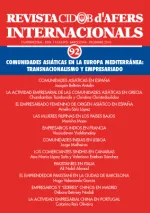The case of the Sindhi traders in the Canary Islands: Transnational relations and economic activity

This article describes and analyses the presence and trading activities of the Sindhi community in the Canary Islands. This group is one of the oldest Asian diasporas in Spain, and is characterised by its hectic trading activity and, particularly, by the fact that it maintains a network of transnational contacts that shows that the community is established in over 100 countries. The starting point of the analysis is the historical, geographic and cultural context that favoured the exodus and arrival of this community to these islands. As other authors have mentioned in studies on transnationalism, and as these authors highlight very clearly with the group examined in this article, relations with members of the same community residing in other countries become forms of capital that provide information and communication on business opportunities and strategies in local enclaves, such as the loaning of capital and training opportunities in commercial activities and specific newly-created businesses that are adapted to certain geographic areas. The Sindhis are a community that, while it has remained faithful to its traditions and is relatively secretive, since the 1950s and with the rise of tourism, it has diversified in its areas of business and its establishment in the territory.
Key words: Canary Islands, Sindhis, trade, Pakistan, diaspora, ethnic entrepreneurs, transnational networks, gender
The full text articles of this issue are available only in Spanish language